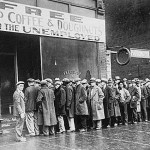 Debtors who have been notified by a state unemployment agency that they have been overpaid — and also that the state would like to be re-paid, pronto — might be able to discharge such a debt with a bankruptcy case.
Debtors who have been notified by a state unemployment agency that they have been overpaid — and also that the state would like to be re-paid, pronto — might be able to discharge such a debt with a bankruptcy case.
Or they might not be able to. It really depends — on the particular facts of each case.
First the basic law: unemployment over payments are not taxes, and are generally discharegable as unsecured debts.
But debtors need to be brutally honest with themselves before charging off to bankruptcy court. Over payments are often the result of working and earning while still collecting an unemployment check, and when this is “discovered” by the state, reprisals ensue.
One response by the state would be to challenge the dischargeability of the debt in bankruptcy court by alleging fraud under section 523 of the bankruptcy code. In that event, the debtor will get a trial on the issue in front of a bankruptcy judge, who will decide whether the debt gets discharged or not.
That didn’t go so well for the debtor in the Searle case in New Hampshire recently. She collected a little more than $14,000 during a period of unemployment, which the state now wants back, because it found out she had done a little part time work during the same time.
This debtor did basically two things wrong: First she seems to have invented her own rule that earnings of less than $350 per week didn’t have to be reported on the unemployment agency’s internet check-in system.
Second, the debtor testified that she went for an in-person interview with a state employee in 2010, when she applied for an extension of benefits. The debtor said the interviewers “had everything in front of them,” meaning all of her earning information, and that therefore, the state was aware of her situation and compensated here anyway.
That MIGHT have worked, except the bankruptcy judge in New Hampshire had no idea of what “everything” was, and therefore it could not conclude that the state was remiss in relying on the debtor’s untrue submissions that minimized her earnings from work.
The moral of the story? Unemployment over payments are technically dischargeable in bankruptcy. But be careful that the over payment is actually due to bureaucratic bungling, and not semi-honesty on the debtor’s part. And be sure everything is documented — on old-fashioned paper, preferably!
by Doug Beaton